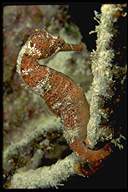Seahorses

Seahorses are unusual looking marine fish in the family Syngnathidae, genus Hippocampus, which contains several species.
Keeping seahorses in an aquarium can be quite interesting, but also very challenging. They are unusual fish in several ways. They swim with their head upright and don't really look very much like fish at all.

Aside from their unusual appearance, they also have unusual reproductive habits. Male seahorses are the ones that become pregnant. The female seahorse deposits her eggs in a pouch on the male's lower abdomen. The male then fertilizes the eggs, and he carries the eggs until they hatch. The gestation period for seahorse eggs is about one month. After the eggs hatch the male does not care for the young. They are fully developed when they hatch and they are on their own. The seahorse fry can be fed mysid shrimp larvae and enriched newly hatched brine shrimp.
Keeping Seahorses in an Aquarium
If you plan on keeping seahorses in an aquarium it is best to obtain seahorses that have been bred in captivity rather than wild-caught specimans. Wild caught seahorses are more difficult to care for due to their feeding habits and the stress involved in being removed from their natural habitat. Stressed fish are prone to disease so it will be worth it for you to try to obtain captive bred specimans that were not subjected to the stress of being removed from their natural environment.

Seahorses must be fed live foods, such as brine shrimp or mysis shrimp, although seahorses born in captivity will sometimes eat frozen foods. Wild caught seahorses are less likely to eat frozen foods and will often eat nothing rather than try the frozen food. If you have captive born seahorses that are willing to eat frozen brine shrimp or mysis shrimp it should be vitamin fortified.
Tank Mates for Seahorses
A species tank is best. Seahorses are typically slow moving fish and you don't want to put them into a tank where you have other fast swimming or agressive fish. Also, you should not keep seahorses with invertebrates that have stinging tentacles, such as anemones and corals.
Seahorses will become ill if stressed or if the water quality in your tank is bad. For more information on seahorses, their diseases, nutrition, water quality needs, and some photos of their young please visit Seahorse.org.
